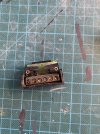Forumers,
I recently game into possession of a few of these LGB 12070. I notice they could do with a little refresh. My understanding is these are a simple circuit with 2 snap action switches so should be fairly harder (they are designed for outdoor use after all). I was considering submerging the terminal block and the screws in something (IPA?) and being careful to keep the snap switches out. Then giving the whole thing a rinse under the tap. Does this seem like a sensible approach or is this heresy?
Can you confirm you are talking about Isopropyl alcohol, not India pale ale. Cos that would be a terrible waste of beer. 
Isopropyl alcohol
- Cleaning General Surfaces
IPA uses include cleaning general surfaces. Types of metal and coated surfaces routinely found in industrial settings are generally unreactive to IPA. However, the cleaner is known to tarnish varnishes and ruin the erasability of dry erase boards.
Varnish and material coating dry erase boards aren’t common in industrial work areas, but IPA’s deleterious effect on these surfaces — an effect that depends partly on the purity of IPA — serve as notice that the compatibility of a material with IPA should be check before the cleaning operation commences.
- Cleaning Electronic Components
IPA uses also involve cleaning electronic parts. The list is long, with some of the more popular IPA-cleaned electronic parts and apparatuses being contact pins in ROM cartridges,
magnetic tape, disk heads for legacy floppy disk drives, computer screens, optical disc drive lasers for CDs and DVDs, and IC packages.
What method of IPA deployment should be used to clean these and other components? The answer largely depends on the geometry of a component and where it’s situated in proximity to surrounding components. Due to aerosol particles’ ability to distribute evenly across intricate spatial configurations, IPA in aerosol form is optimal for parts that have complex geometries or are surrounded by parts that make them difficult to access.
Should work Ok for what you're wanting to do. Usual rules apply.
Do a test piece first.
No smoking! or other ignition sources near work area. (Remember Alcohol burns with a near invisible flame, especially in bright sunlight.)
Ensure work area is well ventilated.
Ensure container is firmly closed after use.
Store container in a cool dry place.
Flash point:
11.7°C
Warning:
Isopropyl alcohol can be absorbed into the body by inhalation of its vapour and is irritating to the eyes and respiratory tract.


